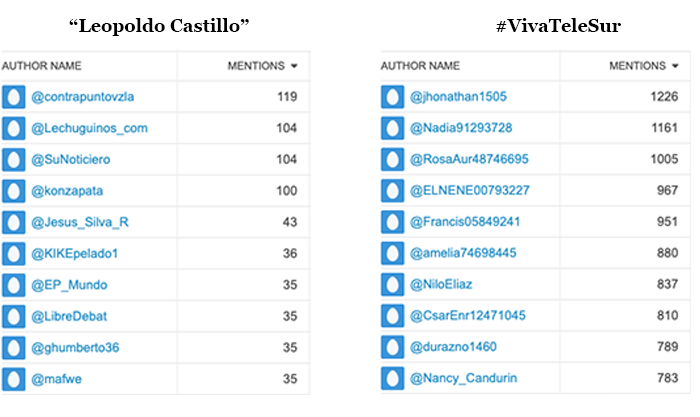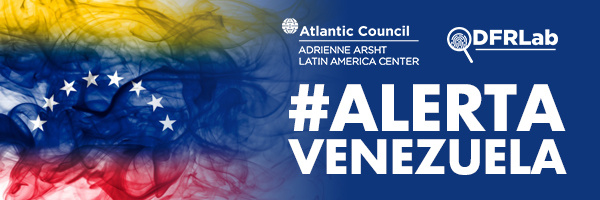#AlertaVenezuela is leading the way in identifying, exposing, and explaining disinformation within the context of one of the Western Hemisphere’s largest crises in recent history, where the fight for control of the information space will continue to pose a challenge for the region.
Top Story
Plans to restructure Telesur stirred public debate in Venezuela
On January 11, Juan Guaidó, president of the National Assembly who is recognized by more than 50 countries as interim president of Venezuela, announced his intention to appoint a presidential commission to oversee the restructuring of the Maduro regime-backed broadcaster Telesur. The announcement started the debate about the future of the media outlet. The regime mounted a significant response on social and traditional media, including on Telesur itself.
History does not necessarily repeat itself, but it certainly rhymed in this case. After a failed coup attempt in April 2002 when local media played a decisive role in spreading pro-coup narratives, Hugo Chavez started a strategy to control traditional media. He nationalized the local media outlets and created Telesur in 2005, which was controlled by Maduro with cooperation from other aligned countries across the region.
Originally created as a TV station, Telesur has since expanded to encompass digital media and has a presence in America, Eastern Europe, and North Africa. Over the last 14 years, it has been controlled by the Venezuelan regime as a “space and a voice for the construction of a new communications order media. [Telesur is] oriented to lead and promote the unification of the peoples of the ‘south,’ geopolitical concept that promotes the struggle of peoples for peace, self-determination, respect for Human Rights and Social Justice.”
Guaidó revealed on Twitter his broad-based plans to restructure the media outlet on January 12, saying “the Commission will assume the task of coordinating with the allies of the region to begin the process of effective replacement of the current signal with a new plural and democratic content that can be transmitted and tuned progressively inside and outside Venezuela.” The next day, during the second National Assembly session of the year, journalist and former diplomat Leopoldo Castillo was confirmed as the president of the commission in charge of restructuring Telesur.
Castillo talked about the plans as president of the commission in an interview to media Evtv, of which he was director up until January 15. Castillo said he will be focused on the broadcasting of democratic, development, and progressive values “without ideology” and along with other countries. He also announced the “rescue” of VTV, the reopening of RCTV and CNV, among other media outlets.
In Twitter trends, “Leopoldo Castillo” appeared as a phrase between January 15 and January 17. An analysis using social media listening tool Brandwatch showed that his name was mentioned 41,048 times between January 11 and January 20. The most active accounts mentioning his name were the official accounts for independent media outlet @contrapuntovzla (119 tweets) and the pro-Maduro blog @Lechuguinos_com(104 tweets).
The responses to Guaidó’s announcement on Twitter and media outlets aligned with the regime increased after the January 15 National Assembly session. Lechuginos published a blog post alleging Castillo’s participation in a 1990 massacre of priests in El Salvador, where he was serving as ambassador of Venezuela. Lechuginosprovided no evidence to support the assertion. Regardless, this narrative was retweeted by other users and media accounts.
Inna Afinogenova, published a video on her YouTube channel, ¡Ahí les va! (“There it goes”). In the video, the journalist, who works for Russian media outlet RT in Spanish, discussed the future of Telesur under Guaidó administration. The video reached 115,410 views on YouTube, 2,009 interactions on Facebook, and 6,388 on Twitter.
Furthermore, Diosdado Cabello, president of the pro-Maduro Constituent National Assembly and Maduro’s second-in-command, tweeted on January 12 using the hashtag #VivaTeleSur. This hashtag was also promoted by Telesur in an article on January 13 that garnered 3,868 interactions on Twitter and 3,191 on Facebook according to CrowdTangle.
The hashtag #VivaTeleSur was mentioned on Twitter 339,487 times by 29,997 users between January 11 to January 20 according to Brandwatch. The hashtag was trending topic from January 12 to January 15 and in addition to the users mentioning it, the DFRLab detected suspicious accounts with bot-like features.
The Twitter accounts @jhonathan1505 (archive) and @Nadia91293728 (archive) posted the hashtag 1,226 and 1,161 times, respectively. @jhonathan1505 had an average of 937 tweets per day from January 17 to January 20, well exceeding 144 tweets per day on average, which the DFRLab regards as highly suspicious.@Nadia91293728 joined recently on December 13, 2019, under the name “Tuiteractiva” (“Twitter active,” essentially) and posted a total of 45,234 tweets until January 20. This account also had a profile photo – one that is also present on other pro-Maduro accounts – and an alphanumeric username, both features of anonymity, a sign of inauthentic activity. @Nadia91293728 posted an average of 1,037 tweets per day, and 100 percent of its tweets were retweets from January 17 to January 20.

(Source: @DanielSuarezPer/DFRLab via Brandwatch)
Talk of the Country
In the Media
The article that garnered the most engagement on social media last week about Venezuela was “Maduro ameaça ‘arrebentar os dentes’ de Bolsonaro” (“Maduro threatens to ‘knock Bolsonaro’s teeth out’”), published by the Brazilian magazine Veja on January 15, 2020. The publication was shared 24,843 times on Facebook and garnered 80,825 interactions, according to CrowdTangle, including shares, comments, and reactions across all public and private posts on Facebook. In total, posts referencing the article received 297,900 engagements on Facebook and Twitter combined, based on a BuzzSumo analysis. The article used information from Spanish news agency EFE and was broadly shared by other international and local media. Nicolás Maduro gave his annual speech to the Constituent National Assembly and said “I know the imperialist plans, and I know in detail the plans of the Colombian oligarchies and Jair Bolsonaro” against the Fuerza Armada Nacional Bolivariana (“National Armed Force”).
In the Venezuelan press, the article that garnered the most engagement on social media was “En VIDEO: Guaidó fue recibido con honores a su llegada a la Casa de Nariño en Bogotá” (On VIDEO: Guaidó was received with honors on his arrival to Casa de Nariño in Bogotá”), published by the independent Venezuelan outlet La Patilla on January 19, 2020. The article garnered 47,831 interactions, including reactions, shares, and comments on Facebook, according to CrowdTangle. The publication showed Guaidó arriving at the presidential house in Colombia, even though the Maduro regime has banned him from traveling, which could result in his arrest upon his return. The article also discussed Guaidó’s meeting with U.S. Secretary of State Mike Pompeo as well as his participation to the Third Western Hemisphere Counterterrorism Ministerial in Bogotá.
What’s Trending
On Social Media
#QuiénPagaLosViajesWaido
The hashtag #QuiénPagaLosViajesWaido (“Who pays for the travels Waido”) trended on Twitter on January 18, 2020, one day before Juan Guaidó traveled to Colombia to attend the Third Western Hemisphere Counterterrorism Ministerial held in Bogotá. Iván Duque, president of Colombia, and Guaidó posted (archive) about their meeting, in which Guaidó stressed his gratitude to Duque for his support for the Venezuelan people.
The hashtag reached 8,732 mentions posted by 150 unique accounts – the DFRLab analyzed over 100 of these accounts in a previous article published on January 14. The accounts coordinated to amplify the hashtag by retweeting, replying, and mentioning each other’s posts, attempting to influence or manipulate the trending topics on Twitter. Their actions suggest they engaged in inauthentic behavior to make the hashtag seem more popular than it was.
Ten percent of the unique authors generated 42 percent of all traffic, and the top 30 most active accounts posted more than 140 tweets mentioning the hashtag on January 18. The accounts @fxckingkxng (archive) and @simonjrrojas (archive), for instance, posted 294 posts each in nearly two hours.

Official Statements
“If there’s respect between governments, no matter how big the United States is, and if there’s a dialogue, an exchange of truthful information, then be sure we can create a new type of relationship […] A relationship of respect and dialogue brings a win-win situation. A confrontational relationship brings a lose-lose situation. That’s the formula.” – Nicolás Maduro in an interview with The Washington Post on January 18.
“Great meeting with #Colombia’s President @IvanDuque and Colombian Foreign Minister Blum today. Their efforts to restore democracy and dignity for millions of long-suffering Venezuelans, including refugees who have fled the repression and ineptitude of Maduro, are commendable.” – U.S. Secretary of State Pompeo via his official Twitter account on January 20.
Our Team in the News
Diego Area, associate director with the Adrienne Arsht Latin America Center, did an exclusive TV interview with NTN24 to discuss Nicolas Maduro’s latest unsuccessful attempt to undermine the Venezuelan National Assembly.
On Thursday, January 16, the Atlantic Council hosted an event on curtailing Nicolas Maduro’s illicit sources of financing. The event was picked up by EFE Noticias and republished by various news outlets throughout the region.
Subscribe to the #AlertaVenezuela newsletter
To receive future editions of the #AlertaVenezuela newsletter each week, sign up below!
